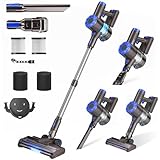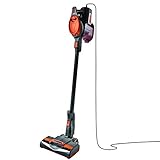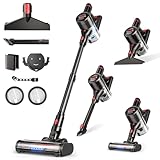Keeping your floors clean can be a daunting task if you don’t have the appropriate vacuum cleaner. When it comes to tile and wood floors, using the wrong vacuum can cause damage and scratches. That’s why we’ve put together a list of the top 10 best tile and wood floor vacuums on the market. In this article, you’ll find detailed reviews and a buying guide to help you choose the best vacuum for your needs. So, if you’re looking for the best tile and wood floor vacuums, you’re in the right place.
Before we get to our review of the best tile and wood floor vacuums, let’s browse through some relevant Amazon products:
Last update on 2026-01-03 / #Ad / Affiliate links / Images from Amazon Product Advertising API
The Best Tile And Wood Floor Vacuums
Understanding Tile And Wood Floor Vacuums: An Overview
Tile and wood floor vacuums are specialized cleaning devices designed to help clean tile and wood floors effectively. They come with a range of features, accessories, and capabilities that allow them to remove dirt, dust, and debris from such hard flooring surfaces with ease.
Tile and wood floor vacuums are typically lightweight and compact in design, making them easy to maneuver around tight spaces and in crevices. They are also equipped with specialized brushes and filters that help loosen and capture dirt and debris from tile and wood flooring surfaces. These vacuums are also ideal for pet owners and allergy sufferers as they are built with advanced filtration systems that can help remove pet hair, dander, and other allergens that might be present on hard floors.
What are the Advantages of Buying Tile And Wood Floor Vacuums?
If you’re looking for a more efficient and effective way to keep your hardwood and tile floors clean, consider investing in a quality vacuum specifically designed for these surfaces. There are several key benefits to using a tile and wood floor vacuum that make it a worthwhile investment for any homeowner.
Efficient cleaning
Tile and wood floors require specialized vacuum cleaners to ensure efficient cleaning. Traditional vacuum cleaners may not be effective as they can scratch the surfaces and leave residue behind. Tile and wood floor vacuums have specially designed brushes and cleaning heads that gently remove dirt and debris without damaging the floors.
These machines have powerful suction capabilities that pick up the smallest particles, including pet hair and allergens. They also have filtration systems that help to maintain indoor air quality by trapping dust and other harmful particles. The efficient cleaning abilities of tile and wood floor vacuums ensure that the floors are left spotless and free of debris, helping to maintain their appearance and durability.
Proper maintenance
Proper maintenance of tile and wood floors is crucial to maintain their aesthetic appeal, quality, and durability in the long run. Regular cleaning and vacuuming of these floors can help remove dirt, debris, and dust particles.
While a regular vacuum can get the job done, specialized tile and wood floor vacuums are designed to clean and protect these surfaces. These vacuums have soft bristles and gentle suction power that safely clean the floors without scratching or causing any damage. By investing in a tile and wood floor vacuum, you can ensure that your floors stay clean and well-maintained, enhancing the overall look of your home or office. Proper maintenance also helps to prevent scuffs and scratches on the floors, which can lead to expensive repairs or replacements.
Improved indoor air quality
Tile and wood floor vacuums can improve indoor air quality by effectively removing dust, dirt, and other pollutants from the floors. When left to accumulate, these particles can become airborne and be inhaled by the occupants of a space, leading to respiratory issues and allergies.
Regular vacuuming with a specialized tile and wood floor vacuum can prevent these pollutants from becoming airborne and improve the indoor air quality. Additionally, some vacuum models come equipped with HEPA filters, which can further trap harmful airborne particles, including pet dander, pollen, and mold spores, enhancing the air quality of the indoor environment. Overall, investing in a tile and wood floor vacuum can lead to better health outcomes and a more comfortable living space.
A Comprehensive Guide to Choose the Best Tile And Wood Floor Vacuums
To ensure a tidy and elegant flooring, it’s essential to find a vacuum cleaner that can effectively clean tile and wood surfaces. However, selecting the best vacuum cleaner among the plethora of options available can be challenging. To make the selection process seamless, here are some key factors to consider.
Type of flooring
The type of flooring in a home or business is crucial to consider when purchasing a tile or wood floor vacuum. This is because different types of vacuum cleaners are designed to clean specific types of flooring. For example, vacuums designed for tile floors typically come with hard bristle brushes that can easily remove dirt and grime from tile and grout lines. On the other hand, wood floor vacuums often come with soft bristle brushes to prevent any potential damage to the wood surface. Therefore, understanding the characteristics of your flooring and finding a vacuum that is designed to work best with it can result in a more efficient and effective cleaning experience.
In addition to preventing damage to flooring, choosing the right type of vacuum can also help save time and money in the long run. Using a vacuum that is not suited for the type of flooring can cause wear and tear, which can lead to costly repairs or even replacement. Furthermore, a vacuum that is not designed for your specific flooring type may leave behind dirt or debris, making it necessary to clean more frequently, resulting in wasted time and effort. By selecting the correct vacuum for your flooring type, you can ensure a longer lifespan for both your vacuum and flooring while also achieving a better clean.
Suction power
When buying a vacuum cleaner for tile and wood floors, it’s essential to consider suction power. Since these types of floors have low pile height and are smooth, dirt, dust, and pet hair can stay on the surface, making it challenging to collect everything with a low-suction vacuum. High suction power will ensure that even the smallest particles are picked up, thus cleaning the floors thoroughly.
Another reason to consider suction power when buying a vacuum cleaner for hardwood and tile floors is to prevent scratches and damage. The more control you have over the suction, the less likely it is that the vacuum will scratch or damage the surface. High suction power and adjustable suction settings help to minimize any damage while still keeping floors clean, making it a top consideration when looking for tile and wood floor vacuums.
Filter system
Filter systems are crucial when looking to buy a tile or wood floor vacuum as they determine the quality of air that is released back into your home. Vacuums tend to stir up fine dust particles, and if the filter system is not efficient enough, these particles can escape, resulting in poor air quality. A good filter system ensures that these particles are trapped and not released back into the air, providing a healthier living environment for you and your family.
Moreover, a high-quality filter system will also extend the lifespan of your vacuum. When dust and other particles clog the motor and the filter, the vacuum’s suction power will decrease, leading to inefficient cleaning and wear and tear on the machine. A good filtration system will prevent debris from getting to the critical components of the vacuum and keep it running smoothly. Therefore, it is essential to consider the filter system before purchasing a tile or wood floor vacuum.
Dustbin capacity
When it comes to cleaning tile and wood floors, it is important to choose a vacuum cleaner that has a suitable dustbin capacity. This is because tile and wood floors usually have more debris and dust than carpets, and a vacuum with a small dustbin capacity will require constant emptying, which can be time-consuming and inconvenient.
Choosing a vacuum with a larger dustbin capacity means that you can clean your floors more efficiently and effectively without the need for frequent trips to the trash can. Moreover, a larger dustbin will reduce the number of times you have to stop cleaning to empty the bin. Therefore, having a suitable dustbin capacity is an important factor to consider when choosing the right vacuum cleaner for tile and wood floors.
Maneuverability
Maneuverability is an important factor to consider when buying tile and wood floor vacuums as it allows you to clean hard-to-reach areas and narrow spaces with ease. Vacuums with good maneuverability are equipped with swivel heads and flexible hoses that can rotate and bend to reach areas under furniture, corners, and edges. This ensures thorough cleaning and leaves nothing behind, making vacuuming less of a hassle and more efficient.
Moreover, vacuums with poor maneuverability can be difficult to operate, especially for older adults or individuals with physical disabilities. It can also lead to fatigue, as you may need to put in more effort and time to clean the floor properly. By choosing a vacuum with good maneuverability, you can save time and effort, and keep your floor spotless.
Cord length/Battery life
Before buying a cordless vacuum for cleaning tile and wood floors, it is essential to consider the cord length/battery life. This is a crucial factor because a cordless vacuum requires a charged battery to function, and if the battery life is low, it may not effectively clean your floors. In addition, if the cord is short, it may not cover a wide area, and you may need to plug and unplug it several times as you move around. Therefore, it is crucial to select a vacuum with an extended battery life that can handle the size of your floors to avoid frustration during cleaning.
Moreover, a cordless vacuum with a long battery life or a corded vacuum with a lengthy cord saves time and makes the cleaning process less challenging. Instead of always having to stop and recharge or swap batteries, you can move around freely without interruption. Similarly, a lengthy cord can reach the farthest corners and the tightest spaces without having to stop and change the power source. Thus, when purchasing a tile and wood floor vacuum, it is essential to consider the cord length/battery life for your convenience and productivity.
Frequently Asked Questions
Can tile and wood floor vacuums be used on carpets as well?
Tile and wood floor vacuums are designed for hard surfaces like tile and wood. While they may have a setting to adjust for low pile carpets, they are not designed to clean carpets effectively. These vacuums may lack the necessary suction power and brush roll to properly clean and remove dirt from carpets. In contrast, vacuums designed specifically for carpets have strong suction power and rotating brush rolls to agitate and lift dirt from carpets. Therefore, it is best to use vacuums specifically designed for carpets to achieve optimal cleaning results.
Additionally, using a tile and wood floor vacuum on carpets may cause damage to carpet fibers or the vacuum itself. The brush roll can get tangled in the carpet fibers, causing damage to both the carpet and vacuum. Furthermore, using a non-carpet vacuum may result in incomplete cleaning as the vacuum may not be able to lift dirt and debris from the carpet fibers. Therefore, it is recommended to use the appropriate vacuum for each surface to ensure efficient cleaning and avoid any potential damages.
Are tile and wood floor vacuums suitable for pet hair on hard floors?
Tile and wood floor vacuums are suitable for pet hair on hard floors, as long as they have the right attachments, such as a crevice tool and bristle brush. These vacuums can easily pick up pet hair from hard surfaces without scratching or damaging them. Some models also come with a special brush designed to work specifically on pet hair. However, it is important to note that not all vacuums are created equal, and it’s always best to choose a model that is specifically designed for cleaning pet hair.
What types of attachments are included with tile and wood floor vacuums?
Tile and wood floor vacuums often come with various attachments that help clean different surfaces and areas. Some common attachments include crevice tools, which are perfect for cleaning tight spaces and corners. These can be helpful in cleaning baseboards, along the edges of walls, or around furniture.
Another attachment that comes with these vacuums is the dusting brush, which is ideal for cleaning delicate surfaces such as baseboard moldings, lampshades, and blinds. The upholstery tool is also included, which is perfect for cleaning upholstered furniture and stairs. Finally, some tile and wood floor vacuums come with a motorized brush roll that is designed to deep clean carpets and remove embedded dirt and pet hair.
Final Thoughts
Choosing the best tile and wood floor vacuum can be challenging, especially with so many great options available on the market. However, by considering the important factors such as suction power, filtration system, and design, you can narrow down your options and find the perfect vacuum for your needs. Remember to also read reviews and compare prices before making a final decision.
In conclusion, investing in the best tile and wood floor vacuum can make a huge difference in the cleanliness and maintenance of your floors. Make sure to prioritize your specific needs and preferences and choose a model that will provide the best cleaning performance and ease of use. With the help of this buying guide, you can confidently choose from the top 10 best tile and wood floor vacuums available in the market.




